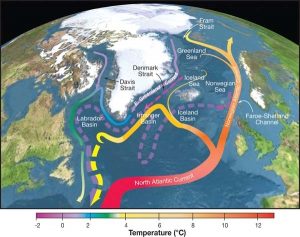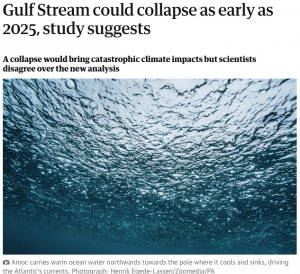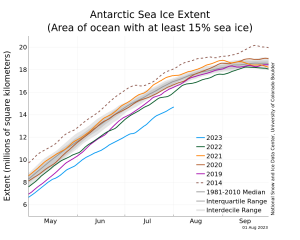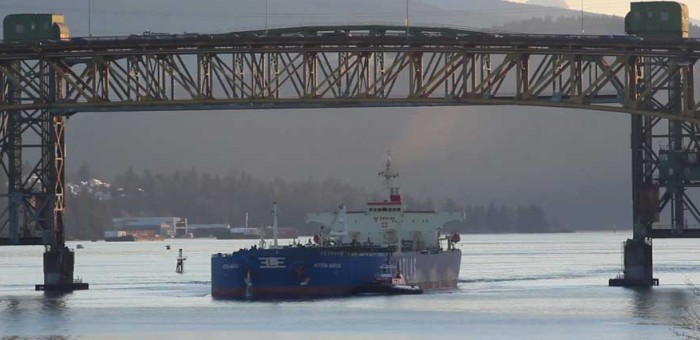Media
The ‘Gulf Stream’ will not collapse in 2025: What the alarmist headlines got wrong
Today I published an article in The Conversation concerning the headlines last week proclaiming the Gulf Stream could collapse as early as 2025. Facebook has decided to block reposting of news stories originating from Canada on their site, so I decided to reproduce the article here. Please go to the link above for the published online version.
Published Article
Those following the latest developments in climate science would have been stunned by the jaw-dropping headlines last week proclaiming the “Gulf Stream could collapse as early as 2025, study suggests” — which responded to a recent publication in Nature Communications.
 “Be very worried: Gulf Stream collapse could spark global chaos by 2025” announced the New York Post. “A crucial system of ocean currents is heading for a collapse that ‘would affect every person on the planet” noted CNN in the U.S. and repeated CTV News here in Canada.
“Be very worried: Gulf Stream collapse could spark global chaos by 2025” announced the New York Post. “A crucial system of ocean currents is heading for a collapse that ‘would affect every person on the planet” noted CNN in the U.S. and repeated CTV News here in Canada.
One can only imagine how those already stricken with climate anxiety internalized this seemingly apocalyptic news as temperature records were being shattered across the globe.
This latest alarmist rhetoric provides a textbook example of how not to communicate climate science. These headlines do nothing to raise public awareness, let alone influence public policy to support climate solutions.
We see the world we describe
It is well known that climate anxiety is fuelled by media messaging about the looming climate crisis. This is causing many to simply shut down and give up — believing we are all doomed and there is nothing anyone can do about it.
Alarmist media framing of impending doom has become quintessential fuel for personal climate anxiety, and when amplified by sensational media messaging, it is quickly emerging as a dominant factor in the collective zeitgeist of our age, the Anthropocene.
This is also not the first time such headlines have emerged. Back in 1998, the Atlantic Monthly published an article raising the alarm that global “warming could lead, paradoxically, to drastic cooling — a catastrophe that could threaten the survival of civilization.”
In 2002, editorials in the New York Times and Discover magazine offered the prediction of a forthcoming collapse of deep water formation in the North Atlantic, which would lead to the next ice age.
Building on the unfounded assertions in these earlier stories, BBC Horizon televised a 2003 documentary entitled The Big Chill, and in 2004 Fortune magazine published “The Pentagon’s Weather Nightmare,” piling on where previous articles left off.
Seeing the opportunity for an exciting disaster movie, Hollywood stepped up to created The Day After Tomorrow in which every known law of thermodynamics was ever so creatively violated.
The currents are not collapsing (anytime soon)
While it was relatively easy to show that it is not possible for global warming to cause an ice age, this still hasn’t stopped some from promoting this false narrative.
 The latest series of alarmist headlines may not have fixated on an impending ice age, but they still suggest the Atlantic meridional overturning circulation could collapse by 2025. This is an outrageous claim at best and a completely irresponsible pronouncement at worst.
The latest series of alarmist headlines may not have fixated on an impending ice age, but they still suggest the Atlantic meridional overturning circulation could collapse by 2025. This is an outrageous claim at best and a completely irresponsible pronouncement at worst.
The Intergovernmental Panel on Climate Change has been assessing the likelihood of a cessation of deep-water formation in the North Atlantic for decades. In fact, I was on the writing team of the 2007 4th Assessment Report where we concluded that:
“It is very likely that the Atlantic Ocean Meridional Overturning Circulation (MOC) will slow down during the course of the 21st century. It is very unlikely that the MOC will undergo a large abrupt transition during the course of the 21st century.”
Almost identical statements were included in the 5th Assessment Report in 2013 and the 6th Assessment Report in 2021. Other assessments, including the National Academy of Sciences Abrupt Impacts of Climate Change: Anticipating Surprises, published in 2013, also reached similar conclusions.
The 6th assessment report went further to conclude that:
“There is no observational evidence of a trend in the Atlantic Meridional Overturning Circulation (AMOC), based on the decade-long record of the complete AMOC and longer records of individual AMOC components.”
Understanding climate optimism
Hannah Ritchie, the deputy editor and lead researcher at Our World in Data and a senior researcher at the Oxford Martin School, recently penned an article for Vox where she proposed an elegant framework for how people see the world and their ability to facilitate change.
 Ritchie’s framework lumped people into four general categories based on combinations of those who are optimistic and those who are pessimistic about the future, as well as those who believe and those who don’t believe that we have agency to shape the future based on today’s decisions and actions.
Ritchie’s framework lumped people into four general categories based on combinations of those who are optimistic and those who are pessimistic about the future, as well as those who believe and those who don’t believe that we have agency to shape the future based on today’s decisions and actions.
Ritchie persuasively argued that more people located in the green “optimistic and changeable” box are what is needed to advance climate solutions. Those positioned elsewhere are not effective in advancing such solutions.
More importantly, rather than instilling a sense of optimism that global warming is a solvable problem, the extreme behaviour (fear mongering or civil disobedience) of the “pessimistic changeable” group (such as many within the Extinction Rebellion movement), often does nothing more than drive the public towards the “pessimistic not changeable” group.
A responsibility to communicate, responsibly
Unfortunately, extremely low probability, and often poorly understood tipping point scenarios, often end up being misinterpreted as likely and imminent climate events.
In many cases, the nuances of scientific uncertainty, particularly around the differences between hypothesis posing and hypothesis testing, are lost on the lay reader when a study goes viral across social media. This is only amplified in situations where scientists make statements where creative licence is taken with speculative possibilities. Possibilities that reader-starved journalists are only too happy to play up in clickbait headlines.
Through independent research and the writing of IPCC reports, the climate science community operates from a position of privilege in the public discourse of climate change science, its impacts and solutions.
Climate scientists have agency in the advancement of climate solutions, and with that agency comes a responsibility to avoid sensationalism. By not tempering their speech, they risk further ratcheting up the rhetoric with nothing to offer in terms of overall solutions or risk reduction.
Temperature records shattered across the world as tourists flock to experience the heat
Yesterday I published an article in The Conversation. It is reproduced below as Facebook appears to be blocking reposting of Canadian news articles.
The Article
This June was the warmest one ever recorded and unprecedented summer heat waves are now gripping southern Europe, China, the Middle East and the southern United States.
In the face of such unprecedented heat, one would think that the world would wake up to the urgent need to rapidly decarbonize energy systems, transition to a low carbon economy and increase investment in negative emission technologies.

California’s Death Valley recorded 56.6 C temperatures, and rather than reflecting on the obvious effects of global warming, tourists flocked to the area. Similarly, thrill-seeking visitors rushed to Xinjiang, China, to experience 80 C surface temperatures and more than 50 C air temperatures.
Tourists also headed in droves to the beaches and historical sites of Italy, Spain and Greece, where governments were warning them to stay indoors to avoid the potentially life-threatening heat.
In Canada, we have already experienced our worst recorded forest fire season. And in British Columbia, where I live, we have already broken the previous 2018 record with more than 13,900 square kilometres burnt. And this is just the beginning of the 2023 fire season.
Remarkable cognitive dissonance
 I doubt those jetting off to visit the heat-ravaged regions of the world are aware that Antarctica has already shattered previous sea ice melt records, with potentially dire consequences for glacial outflow and future sea level rise.
I doubt those jetting off to visit the heat-ravaged regions of the world are aware that Antarctica has already shattered previous sea ice melt records, with potentially dire consequences for glacial outflow and future sea level rise.
Are tourists aware that coral reefs worldwide are in the process of dying off on an unprecedented scale?
Perhaps they might want to reflect on the fact that Earth has already warmed by around 1.1 to 1.2 C since pre-industrial times.
Many may not realize that even if worldwide fossil fuel combustion was immediately eliminated, the roughly 0.5 C cooling contribution of atmospheric aerosols — also the result of existing fossil fuel combustion — would rapidly dissipate through gravitational settling and precipitation scavenging of these aerosols. This would cause the Earth to warm rapidly to around 1.6 to 1.7 C above pre-industrial levels.
The warming does not end there, as the planet is on course to go well above 2 C in the decades ahead once reduced aerosol cooling, permafrost melt and other greenhouse gases are taken into account.
I suspect that these travellers are unaware that when these other pesky greenhouse gases are included, the net radiative effect is equivalent to 523 ppm CO2e, of which only 417 ppm is from CO2 alone.
The Paris Agreement
Governments worldwide have signed on to the 2015 Paris Agreement committing nations to collectively limit global warming to well below 2 C above pre-industrial levels while pursuing efforts to limit the temperature increase to 1.5 C.
The Paris Agreement might appear promising. But the reality is that the 1.5 C guardrail cannot be met, and that socioeconomic inertia prevents us from even staying below the 2 C threshold. Even if every country met its promised emissions reductions, global mean temperatures would still soar past 2 C.
We have known for more than 15 years that “if a 2.0 C warming is to be avoided, direct CO2 capture from the air, together with subsequent sequestration, would eventually have to be introduced in addition to sustained 90 per cent global carbon emissions reductions by 2050.”
So, while governments, industry and public sector institutions worldwide are announcing their intention to reach net-zero emissions by 2050, the reality is these are nothing more than aspirational goals made by decision-makers who will not be around to be held accountable for the decisions they made.
Reaching net-zero
To meet the target of these net-zero claims, most will rely on so-called nature-based solutions such as planting trees, using biochar in soils to enhance soil carbon uptake and restoring mangroves, salt marshes and seagrass meadows.
To be clear, nature-based climate solutions have an important role to play.
Human disruption of natural ecosystems has accounted for about 30 per cent of historical greenhouse gas emissions, so it is reasonable to expect nature-based climate solutions to have a key role to play moving forward.
But there are limits, not the least of which is that global warming will continue to cause increased wildfires in the years ahead. And these wildfires release the carbon stored in the vegetation back to the atmosphere.
While nature-based solutions can help in climate change adaptation and the preservation of biodiversity, there is a growing danger that governments, industry and the public will come to rely on them to maintain the status quo, thereby delaying what is actually needed.
 We now need an immediate transition towards the decarbonization of global energy systems and the widespread introduction of negative emission technology, such as direct air carbon capture and deep underground carbon sequestration.
We now need an immediate transition towards the decarbonization of global energy systems and the widespread introduction of negative emission technology, such as direct air carbon capture and deep underground carbon sequestration.
This is the only hope humanity has for a long-term solution to global warming.
We can take comfort in the very real successes of nature-based solutions and their many benefits. But we cannot take our eyes off the scale of the challenge before us. While all the solutions are known, achieving the goals of net zero emissions in the future is a matter of individual, institutional, corporate and political will.
Rather than jetting off around the world to feel the heat, perhaps it’s time for everyone to take a good hard look at their individual contribution to global warming.
Each of us is part of the problem, meaning that each of us can also be part of the solution. And this notion can create an environment ripe for innovation and creativity — the foundational requirements of any prosperous and vibrant future.
Responding to the BC NDP 2020 Budget
Today the BC NDP delivered the budget for the next fiscal year. Below I reproduce the media release my office issued in response to it. As you will see from the release (reproduced below), I was pleased with Budget 2020 and I look forward to expanding on these initial remarks when I respond in the legislature hopefully tomorrow.
Media Release
MLA Weaver responds to 2020 Budget
For Immediate Release
February 18, 2020
Victoria, BC — The BC NDP’s 2020 Budget is one that invests in the people of British Columbia and charts a path forward for a sustainable economy that works for everyone.
“I’m delighted to see this government continuing to work towards lowering the cost of living for middle class British Columbians,” said Andrew Weaver, MLA for Oak Bay-Gordon Head. “Actions such as the elimination of MSP premiums which I have long advocated for, the construction of new affordable housing units, the raising of earnings exemptions for those on income and disability assistance, and increased funding for childcare and public education should ensure that the benefits of economic growth in BC are widely shared”.
While the 2020 budget introduces several changes that positively impact the lives of British Columbians now, it is also forward looking, making significant investments into the future of the province and in particular today’s youth. Funding dedicated to increasing the supply of teachers, counsellors, and psychologists contribute to the positive social and cognitive development of our children as they move through school.
The creation of the needs-based, up-front BC Access Grant should equalize post-secondary educational opportunities in the province by allowing students to focus on their studies without worrying about how they are going to pay for their tuition. New 24/7 mental health resources for students at post-secondary institutions should no longer place young adults in a position where they feel like they have to choose between their personal well-being and academic success.
“BC’s 2020 budget also makes necessary infrastructure investments, at a time when access to capital is cheap, to manage a growing population while, at the same time, transitioning the province to a low-carbon economy by linking capital expenditures to Clean BC,” adds Weaver.
The construction of new hospitals, bridges, roads, houses, and schools promise to create numerous good, well-paying jobs in all regions of our province in addition to alleviating strains on public services.
“Innovative design and the integration of BC engineered wood products and energy/energy conservation systems into these capital projects demonstrates British Columbia’s ongoing leadership in recognizing that the reduction of greenhouse gas emissions can be paired with job creation throughout the province,” notes Weaver.
Although the budget does continue to devote resources to projects which I continue to oppose, such as the Site C dam and LNG developments, I am pleased that the government is now demonstrating its commitment to the economy of tomorrow by supporting the emerging bioeconomy, the quantum computing sector, the agri-tech and life sciences. The continued backing of renewable energy projects, ZEVs, and electric aircrafts will make our economic growth largely sustainable.
At its heart, the 2020 budget is one that places people first while embracing the opportunities created by technological and climatic change, ensuring that BC is well positioned to thrive moving forward.
MLA Weaver will monitor the progress and implementation of these budget measures to ensure they benefit the people of British Columbia.
-30-
Media contact
Judy Fainstein
Executive Director
Legislative Office of Andrew Weaver, MLA
+1 250-744-7615 | Judy.Fainstein@leg.bc.ca
The Democracy & Me Art Contest is now open to all BC children & youth
The Legislative Assembly of British Columbia and the Lieutenant Governor of British Columbia have co-sponsored The Democracy & Me Art Contest.
 As noted in the contest poster to the right, it encourages K-12 students to create visual artwork that explores the importance of community and democracy.
As noted in the contest poster to the right, it encourages K-12 students to create visual artwork that explores the importance of community and democracy.
Contest winners will receive a trip to Victoria and their artwork will be displayed in the provincial Parliament Buildings.
Artwork must be submitted by January 31, 2020.
Please visit the The Democracy & Me Art Contest website for further details on how to submit your entry.
Statement on Trans Mountain Pipeline expansion project approval
Today Justin Trudeau once more announced the approval of the now Canadian Taxpayer owned Transmountain Pipeline project. Those who have followed this blog over the last few years will know I have extensively commented on the fiscal folly of the federal government stepping in to buy the pipeline after Kinder Morgan abandoned the project in response to changing market conditions for expensive-to-extract, high-sulphur, Alberta-based diluted bitumen.
Below I reproduce the media statement my office released in response to the federal government’s announcement.
Media Release
Statement on Trans Mountain Pipeline expansion project approval
For immediate release
June 18, 2019
VICTORIA, B.C. – In response to the Federal Liberal Party’s approval of the Trans Mountain expansion project, the B.C. Green caucus has released the following statement:
“The Liberal government’s decision to forge ahead with the Trans Mountain Expansion project is an abdication of their responsibility to Canadians to show climate leadership,” said Andrew Weaver, leader of the B.C. Green party.
“Just yesterday these very same Ministers supported a motion that declared a climate emergency. How can this government declare a climate emergency and yet continue to invest in major expansions of fossil fuel infrastructure that will last 40-50 years?”
“Now is the time for elected leaders to be bold and courageous. We need to urgently begin the transition away from fossil fuels and toward a clean, sustainable economy — to invest in clean technology, to help workers transition, to truly protect the environment upon which a healthy economy depends.”
In addition to the climate crisis, the flawed First Nations consultation process, and the impacts on the endangered Southern Resident Killer Whales, there is also growing concern that the pipeline is a fiscally foolish project, now reliant on taxpayer money. Earlier today, Chief Leah George Wilson of Tsleil-Waututh Nation joined the former Federal Environment Minister David Anderson in highlighting evidence that there is no compelling business case for the Trans Mountain expansion project. This includes concerns that the Asian market that is so often used as justification doesn’t exist for Alberta bitumen.
“No compelling business case has been made for the expansion, with Kinder Morgan offloading the risk onto the Canadian taxpayer. Proceeding with the Trans Mountain expansion is a reckless use of taxpayer money.”
The B.C. Green Caucus has consistently been opposed to this project, including in the confidence and supply agreement with the NDP government that commits the government to using every tool available to stop the expansion project.
-30-
Media contact
Stephanie Siddon, Research and Communications Officer
+1 250-882-6187 | macon.mcginley@leg.bc.ca








